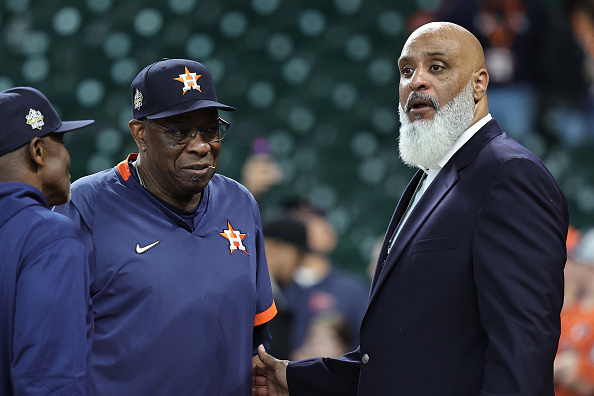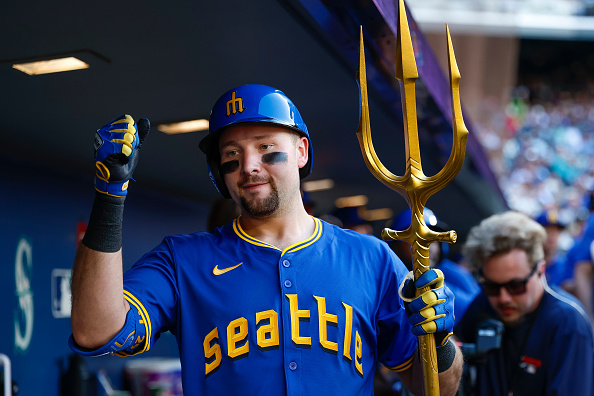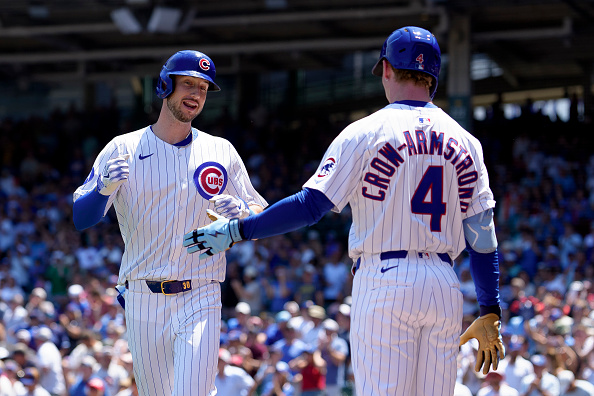Over the weekend, MLB Union Boss, Tony Clark, emphatically stated he’d never agree to a salary cap.
There’s no doubt Clark meant every word, and his stance is as predictable as the sun rising every day. However, he’s delusional in his thinking, and unless he and MLB change that stance, baseball will fall further behind the behemoth of the NFL.
For the record, I’m not a fan of Tony Clark. Didn’t care much for him as a player, and I certainly think he’s the worst Union leader in all of sports. Now to be fair, I’ve never met the man, nor would he ever meet me. I’m at best a modest baseball fan, but it’s clear to me, he does not understand the economics of a sport that is losing millions of fans each year.
As a long-suffering Kansas City Royals fan, I’ve been fortunate to win a couple of World Series titles in 1985 and 2015, and I’ve watched a few other underdog teams fight through competitive financial limitations to show spending the most money does not guarantee you postseason success.
In 2020, the San Diego Padres had one of the lowest payrolls in baseball at $69 million. Fast forward a few seasons and they now boast a $232,534,545 payroll on the books. That pails into comparing the New York Mets, $267,954,047, and their counterpart in the state, the New York Yankees, who have a payroll of $304,893,332.
“We’re never going to agree to a cap. Let me start there,” Clark said at the MLBPA’s recently opened satellite office in Arizona. “We don’t have a cap, we’re not going to agree to a cap.”
The man in charge of destroying baseball also said that the recent spending spree of the teams willing to pay the luxury tax and attempt to buy a World Series title should be applauded.
Sadly, he has a valid point.
After all, his job is to cater to the elite players and their record-breaking contracts that tip the scales to billionaire owners willing to ignore common sense and attempt to buy superteams because they have endless pockets and rich local TV deals.
Listen, this isn’t an old trick. The Yankees did it for decades, but since the Derek Jeter days, despite record earnings, they haven’t won anything. The same can be said about the New York Mets. Further, despite outspending the Los Angeles Dodgers, the best team in baseball, the Padres haven’t won crap either.
The financial disparity in Major League Baseball will likely never change. The history of the sport continues to show most baseball owners live by one rule: greed. They talk a good game regarding unity, but in the end, they only care about themselves. The sport has some solid owners who attempted to do the right thing in last year’s labor talks, but ultimately, they lost out on any real change to the financial unbalance of the sport, to the men with deeper pockets.
At one point, super agent Scott Boras did his best to destroy the game by demanding small market teams trade their future stars to contenders, and by doing so, creating bidding wars to achieve life-altering contracts for his clients that defy logic or common fiscal sense.
Fast forward to 2023, and though Boras still has teeth in the game and swag among the elite players, it’s Clark who has the fate of baseball in his hands now.
“You don’t want to start the year where any one particular fan base doesn’t believe their team has a chance to win,’’ Clark says, “but a lot of that is predicated on what the team does in order to compete and win.”
To his credit, he’s correct, but it’s also a dicey comment to make.
The salary cap issue resolution falls at the feet of the owners who don’t want a floor, so a top-end salary conversation is mute. Clark isn’t the only culprit in the financial saga facing the game. The rest of the blame game falls on MLB Commissioner, Rob Manfred, who adheres to the whim of the mega barons at the top of MLB’s ownership structure.
As a result of bowing down to the richest of owners, he’s accepting the new spending free in baseball remains good for the game. Instead, it has only accomplished one thing.
Prior to the new labor deal signed a year ago, two-thirds of the league was out of the playoff picture by the end of April. With the expansion of the postseason, something I concur was needed to gain interest in October when the NFL is in full swing, that elimination date has been pushed back to the end of May when NBA and NHL playoffs are at their peak.
With this reality, for their financial restraints in the offseason, many teams will trade off their assets to build their minor leagues. In doing so, perhaps they can be one of the smaller market teams that can emerge as a one- or two-year postseason contender before the cycle repeats itself as a have-not franchise.
In the end, what Clark and MLB owners fail to understand, is fans want competitive balance in the sport. The NFL continues to show that their barons of the sport understand the equality of all 32 members financially to ensure every regular season game has meaning.
MLB has a 162-game regular season, something they’ll need to adjust in the future, and the NFL has 17 regular season games. However, if you’re a fan of attending baseball games, especially in NFL cities, your team better be in playoff conversation before the All-Star break and before NFL training camps begin in late July.
Further insulting the fan apathy, unless baseball can fix the recent pending bankruptcy of their local TV providers, Sinclair and Ballys, who span 14 markets, the team-specific fan base who are restricted by archaic blackouts, might bypass the season altogether.
Major League Soccer took a cue from its fans and signed a mega-deal with Apple TV that has zero blackouts.
If your team is out of postseason contention and you live in another state, will you continue paying for the MLB blackout package?
Back to the main issue.
With the season less than a month from beginning, finding common ground to create a floor-to-ceiling salary cap in baseball, which could save the sport from falling further behind the NFL, college football, and college basketball falls directly on Clark and Manfred.
For now, Clark isn’t budging, and he has no reason to change his stance. The MLB owners, whom Manfred is supposed to lead, know they don’t want to be told how to spend their money. So, the impasse remains the biggest elephant in the room and will eventually create even more fan apathy until they simply don’t care about baseball anymore.
I hope that’s not the case because I enjoy watching other professional sports until the NFL kicks off in September.
Check us out on our socials:
Twitter: @PTSTNews and @TalkPrimeTime
Facebook Page: Prime Time Sports Talk
Join our Facebook Group: Prime Time Sports Talk
Instagram: @primetimesportstalk
Follow Nick Athan on Twitter @ChiefsInsider
Main Image Credit:







